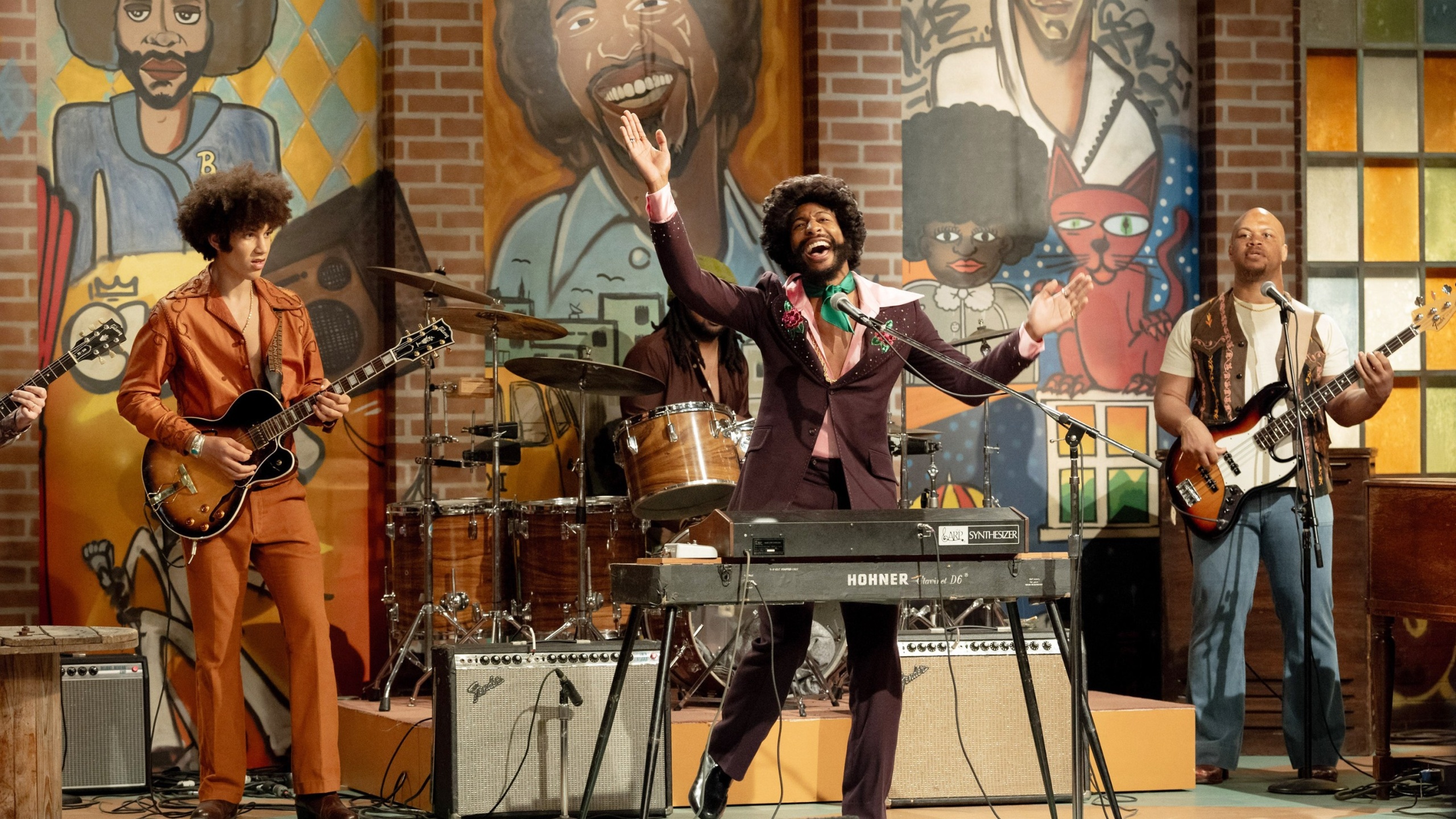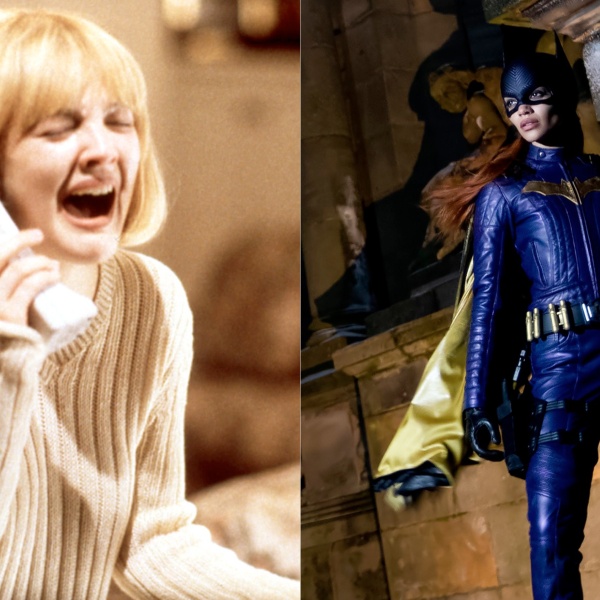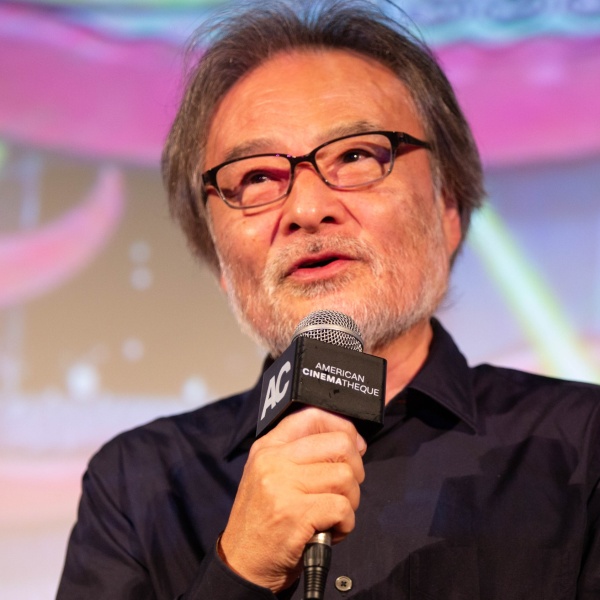Much has (and should be) written about the incredible job the cast of “Saturday Night” do in breathing new life into the comedy legends featured in the original “Saturday Night Live” lineup. It’s not perfect mimicry, of course, but it feels like what the best adaptations do: an interpretation that pulls us into the world of Studio 8H.
Another key component of the film mirrors what the cast is doing, both in how it was made and how it works inside the Jason Reitman film. The score, created live on set by composer Jon Batiste and the band he assembled for the film, embodies the clock ticking ever closer to showtime — the thing Batiste told IndieWire is the true villain of the story, however much Willem Dafoe’s NBC exec leers at the proceedings. But Batiste’s music also embodies the creativity of working in an intensely collaborative, almost improv-style, and evokes, in its own way, that attempt to playfully echo the past. His work is harkening back to his own elders, too.
“The African diasporic tradition of learning music and passing on wisdom from the elders is an oral tradition. Yeah, you learn music from a page and from books, but you also learn it orally by sitting in a circle with an elder,” Batiste told IndieWire. It’s a practice that infused his learning growing up in New Orleans, where the oral tradition of teaching is unbroken, even at NOCCA (the New Orleans Center for Creative Arts), where Batiste studied and which also claims Wynton and Branford Marsalis, Harry Connick, Jr., and Terence Blanchard as alumni.
“The same teachers who were there, the late great Alvin Batiste, the late great Ellis Marsalis, the late great Kid Jordan, these are people who were instrumental in teaching us this way and being there for each generation. You know, four or five of those elders were there for 40 years and dedicated themselves to teaching us this oral tradition of music,” Batiste said.
It was not much of a stretch, therefore, for Batiste to reach back four or five decades himself to find the right sound for “Saturday Night.” Throughout shooting, Batiste and his band would come back in the evening after the day was wrapped (in street clothes, as opposed to the fly purple suit he wears while playing “SNL” musical guest Billy Preston) and work for a couple of hours on cues for sequences roughly put together by Reitmann and the editing team. Sometimes the cast would continue to hang out and watch, too.
Because of the compressed time frame, Batiste would often take a few minutes to work through an idea in his head and then have to tell it, verbally, to the band and then come together to play. “I was basically showing the musicians the music, the way that I learned music from those elders. It was like a flashback, but I haven’t ever really changed that for many years. I still utilize that approach,” Batiste said.

It felt perfect for sonically compounding the chaos of “Saturday Night” and something Batiste would be excited to see more films try. “It’s normal to think of a score as orchestral, composerly,” Batiste said, “where the strings and the timpanis and all those devices tell you how to feel emotionally, and they’re your cue in a way that we’re very familiar with. And anytime someone breaks that paradigm, it’s pretty wonderful.”
It’s not a new thing — Batiste said he drew inspiration from scores as varied as “American Graffiti,” Duke Ellington’s sleekly amoral score for “Anatomy of a Murder,” and the Trent Reznor and Atticus Ross cortisol-spiking music for “The Social Network” — but it does provide a much-needed edge to “Saturday Night.”
“It’s a pressure cooker, and New York City, with all of its eclectic wonder, is the backdrop of all that’s happening. So you have Pedrito Martinez, who’s one of the foremost percussionists in the Afro-Latin diaspora of music playing on the soundtrack, and then you have Cory Henry, who’s an organist in the Brooklyn church tradition of New York City, where a lot of those musicians who would pass through ‘SNL,’ that famed house band… there’s so many musical traditions that I’m drawing from while creating this musical representation of the ticking clock,” Batiste said.
The clock is the all-important character. Batiste told IndieWire that the sharp, sometimes discordant, sometimes howling cues could still work hand-in-hand with the film’s sound design and editing rhythm because the point was never to have every element in the film line up neatly. “The balance of the sound effects, the dialogue, and the music was something that we learned [that] you can push the norms of what that is. Sometimes the dialogue doesn’t have to be first,” Batiste said.

But what was particular to the scoring process for “Saturday Night” was the immersiveness of being on set and surrounded by that environment. “The sound and the room tone of the scenes is the same sound and room tone of the score, which makes it all feel integrated in this very magical way,” Batiste said. “You’re connected to the energy of that day, and you’re with the cast and the crew and the director while making the music.”
The bespoke surroundings were special, but so was a sense of impermanence — the same group of musicians, cast, and crew will never be gathered after doing that specific shooting on that specific day ever again — that worked its way into the music, too. “It just all feels very, very present in a powerful way,” Batiste said. “That’s what I love about this that I would take to other movies. You compose to [try and find] what that pocket of presence is, so that [the score] feels deeply integrated in the way that this felt. Even if you didn’t know how this score was made, you would still feel that presence.”
The miracle of “Saturday Night” is that communal experience comes together at the end, and the miracle of the “Saturday Night” score is that the presence Batiste and his musicians captured in those on-set recordings persisted once it was all put together in the edit.
“We were looking at the footage and Jason was editing the final versions of things. And I was listening to the score and seeing how it fit with those final versions of the edit. And it all just came together beautifully,” Batiste said. “Usually that first take [we recorded] is the take of the cue that you hear in the movie.”
The score for “Saturday Night,” then, can truly be said to be live.




